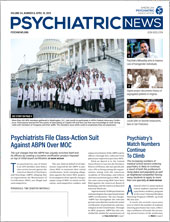Adolescents and young adults are much more likely to continue filling opioid prescriptions months after they recover from surgery if other people in their family have long-term opioid use, according to a study posted February 27 in JAMA Surgery.
Jennifer Filip Waljee, M.D., an associate professor at the University of Michigan Medical School, and colleagues studied data from a commercial insurance claims database for 346,251 patients aged 13 to 21 years. The patients had no history of opioid prescriptions for a year prior to undergoing dental or surgical procedures between January 1, 2010, and June 30, 2016. Among the procedures were tooth extraction, tonsillectomy, appendectomy, hernia repair, arthroscopic knee or shoulder surgery, and upper extremity fracture.
The researchers defined persistent opioid use among the patients as one or more opioid prescription refills 91 days to 180 days after the procedure. They defined long-term opioid use among family members as one or more family members who either filled opioid prescriptions totaling 120 days’ supply or more during the 12 months before the patient’s procedure or filled three or more opioid prescriptions in the 90 days before the patient’s procedure.
The researchers found that 4.1 percent of the patients with a family member with long-term opioid use developed persistent opioid use, compared with 2.4 percent of those whose families had no long-term opioid use.
“We were trying to think from the perspective of a surgeon of what I could ask to help me understand who is going to continue to use opioids and who will not,” said Calista Harbaugh, M.D., a general surgery resident at the University of Michigan and a researcher in the study. “We constructed this study in a way to align with asking whether there is anyone else in the family currently using opioids. That could factor into the decision tree of how to follow up and recognize when high refill rates might be becoming a problem.”
Harbaugh added that the results suggest a need for greater communication among health professionals.
“For many common operations like dental extraction, appendicitis, and tonsillectomies, often the care model is that the adolescent has the procedure and is never followed up again to see whether he or she has any problems. [Our results] highlight the need to communicate to the primary care provider and others what the expectation is for pain and recovery so they would know not to expect the patient to have pain three months after the procedure,” Harbaugh said. “Asking for a refill may be a sign of a problematic pattern of use, and where there are concerning patterns, we should ask patients about it.”
This study was funded by the Substance Abuse and Mental Health Services Administration and the Centers for Medicare and Medicaid Services. ■
“Association Between Long-term Opioid Use in Family Members and Persistent Opioid Use After Surgery Among Adolescents and Young Adults” can be accessed
here.

